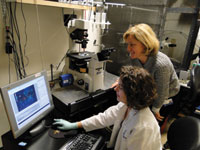- News
- Early life seizures and autism - Rapamycin might be preventive
Early life seizures and autism - Rapamycin might be preventive
Seizures in early life are associated with autism with about 40% of patients with autism also having epilepsy as comorbidity. A study from Boston Children's Hospital finds a reason for the link, and suggests that the mTOR inhibitor rapamycin ,already shown to be safe in children, could help prevent autism from developing in newborns who have seizures.
 Frances Jensen (standing) with her postdoc Jocelyn Lippman BellFrances Jensen and colleagues at the Department of Neurology and the F.M. Kirby Neurobiology Center at Boston Children's Hospital used a rat model to show that early seizures not only resulted in epilepsy later in life, but also produced autistic-like behaviour. They have shown that disabling the mTOR pathway – by giving the drug rapamycin before and after seizures – prevented development of abnormal patterns of connections (synapses) between brain cells, reduced later-life seizures and eased autistic-like symptoms.
Frances Jensen (standing) with her postdoc Jocelyn Lippman BellFrances Jensen and colleagues at the Department of Neurology and the F.M. Kirby Neurobiology Center at Boston Children's Hospital used a rat model to show that early seizures not only resulted in epilepsy later in life, but also produced autistic-like behaviour. They have shown that disabling the mTOR pathway – by giving the drug rapamycin before and after seizures – prevented development of abnormal patterns of connections (synapses) between brain cells, reduced later-life seizures and eased autistic-like symptoms.
Dr Jensen's group in a related study published last year has shown that seizures exaggerated excitation and synaptic strengthening too soon in a rat model, causing synapses to lose their plasticity -- their ability to reconfigure in response to input from the outside world and following administration of the drug NBQX, which blocks receptors associated with excitation, these problems were reversed.
The mTOR pathway is already known to be over-active in tuberous sclerosis complex (TSC) which often includes epilepsy and autism. Boston Children's Hospital is currently conducting a clinical trial of rapamycin in children with TSC.
This study suggests that even without tuberous sclerosis, seizures are inducing the mTOR pathway, and might on their own be contributing to the development of autism. The fields of epilepsy and autism may thus inform each other about new treatment targets.
SOURCE : Boston Children's Hospital
Citation: Talos DM, Sun H, Zhou X, Fitzgerald EC, Jackson MC, et al. (2012) The Interaction between Early Life Epilepsy and Autistic-Like Behavioral Consequences: A Role for the Mammalian Target of Rapamycin (mTOR) Pathway. PLoS ONE 7(5): e35885. doi:10.1371/journal.pone.003588
For further background, see this feature published last year in Nature Medicine
Read More